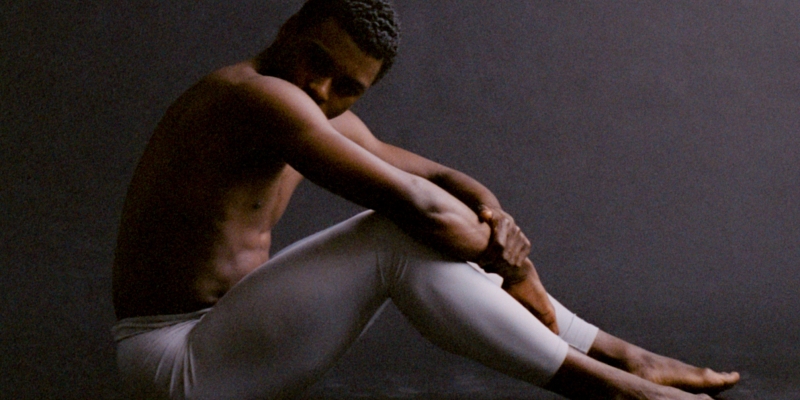
Thursday, May 12th, 2022
Samuel Akins - Part 2: Black in the Paris Opera Ballet
Cover image: Samuel Akins
Image by Jess Brohier
In Part 1 of this article series, Samuel Akins told Entrée to Black Paris how he came to audition for the Paris Opera Ballet and be invited to dance with the troupe for the 2021-2022 season. Today, we'll look at how the season is unfolding for him.
ETBP: You returned to Paris from Australia in October of 2021. When was your first performance?
SA: It was November 30, I think, or the beginning of December. We had two months to prepare a piece called Le Sacre du Printemps (The Rite of Spring). I would say it was the first piece that inspired modern dance. The music is by Stravinsky, and it was choreographed by Nijinsky.
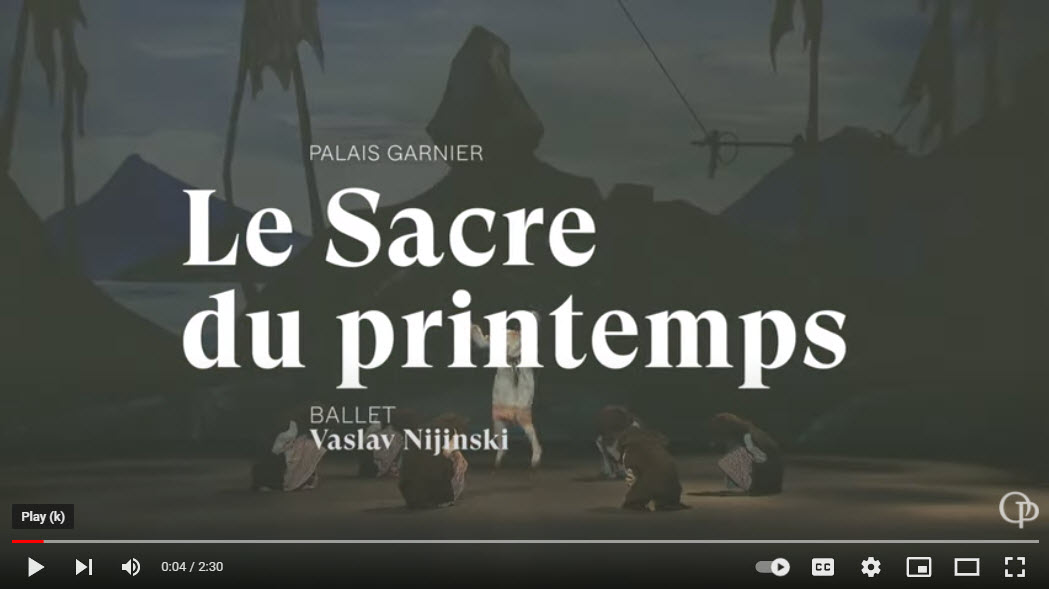 Screenshot of trailer for Le Sacre du Printemps
Screenshot of trailer for Le Sacre du Printemps
When you start at the Opera, you have a three-month, fixed-term contract. So, I didn't know if I would be staying after January. I was cast in the ballet, so I was lucky enough to perform in every show.
The opera had a lot of trust in me very early on. I think this may be because they had seen my resume and liked my talent and my professional career. I'd come with a lot of students, or people who were just starting their professional career.
ETBP: What were these first three months like, professionally speaking?
SA: When I look back now, I didn't realize how hard things were for me, especially during my first month. I'd never lived in France or Paris, and finding an apartment and all that stuff was difficult.
Professionally, it was just enough time for me to see what the opera was like – to see if this was a track/pathway that I would like to take. If it turned out that I didn't like it, if things weren’t working for me, I would have an end point.
Obviously the opera would have the same option.
It took me a while to get to Paris, because I needed a visa. I was granted my visa on a Friday, then flew to France on the following Monday. I started work on a Tuesday. I packed up my whole life, because I didn't know if I'd be in Paris for only three months or for longer.
Adjusting was hard because I was thrown into rehearsals all day, I didn't speak any conversational French, I didn't dance in the French style – which is very important – and I also didn't know anyone!
But from Day One (just like for the audition), I kept telling myself "You just need to give it your all. And whether you stay after these three months or not, you will look back and know that you did everything you could."
I remember going to my first class and thinking "How am I here? Why am I here? Because I am definitely the darkest person in the room." Understanding that and occupying that space was a personal challenge at first.
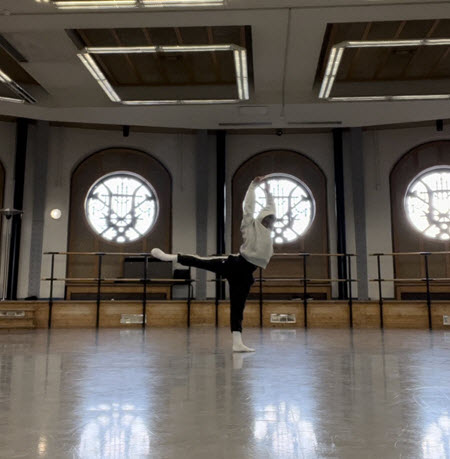 Samuel Akins in the studio
Samuel Akins in the studio
Image courtesy of Samuel Akins
ETBP: You mentioned not dancing in the French style. Please elaborate on this.
SA: Well, there were times when I felt like a complete outsider – even through my dance. It was overwhelming, because everybody seemed very "uniform," and I just did not feel that uniformity, obviously.
We have classes called Moins de trois ans, which have helped me tremendously. If you've been with the company less than three years, you take these classes several times a week and are coached in French Technique.
The classes were a challenge at first because they are pretty intense. French technique is very precise and incredibly particular, and you have to do everything to the "T."
I'm coming from America, where dance is more focused on emotion, speed, and expression. It was different for me to wind that back a bit. However, It has been a nice challenge.
Entering the Opera at the age of 25, I'm a little bit into my career and I feel I’ve already started to find my artistic voice. I look at this process as me re-finding my voice in a way, with the addition of this new style. I think it’s important for me to remind myself that I am American and my differences are what make me special.
Yes, I'm learning the language and yes, I am moving in a more stylistically French way, I suppose. But my heart is American. I can't change that. I don't want to change that. I think that is my drawing card. It's my ... special power.
ETBP: I can see that advocacy is a huge part of your life and career. How has that impacted your work with the Paris Opera?
SA: During the Black Lives Matter uprising, it became evident that the ballet world needed an overhaul. Because of the [Covid] shutdown of the world, we had time to recognize our issues and start working toward change. However, many dance companies remained silent and chose inaction over action.
This was a huge moment in my dance career. I chose to speak about my experience being a Black dancer in Australia.
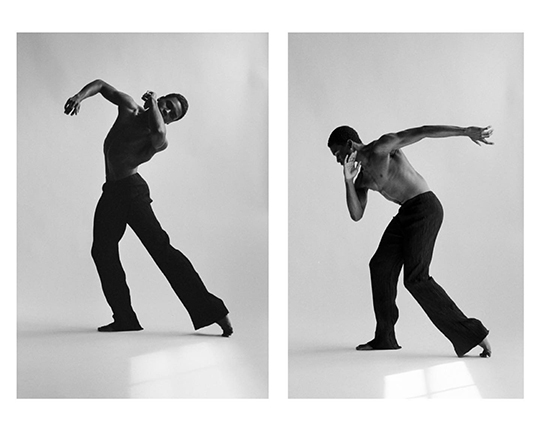 Samuel Akins
Samuel Akins
Photos by Jess Brohier
After this frustrating period, I decided that for future chapters in my dance career – wherever I go – I have to make sure the institution I dance with is actively working towards bettering itself and has progressive practices in place for racial diversity, equity and inclusion.
There is group of incredible Black dancers in the Paris Opera who came together and addressed their experiences and issues within the working environment. There is a New York Times article about this process and how it’s being resolved. Seeing these dancers' work around this issue published publicly was a huge part of why I did the audition.
ETBP: You came on a three-month short-term contract, and you were extended. Were you extended for another short-term contract or for a full-time contract?
SA: About two months into my first contract, I found out that I would be working on the upcoming production, La Bayadère. The contract was extended again after that. Now I'm staying until at least July.
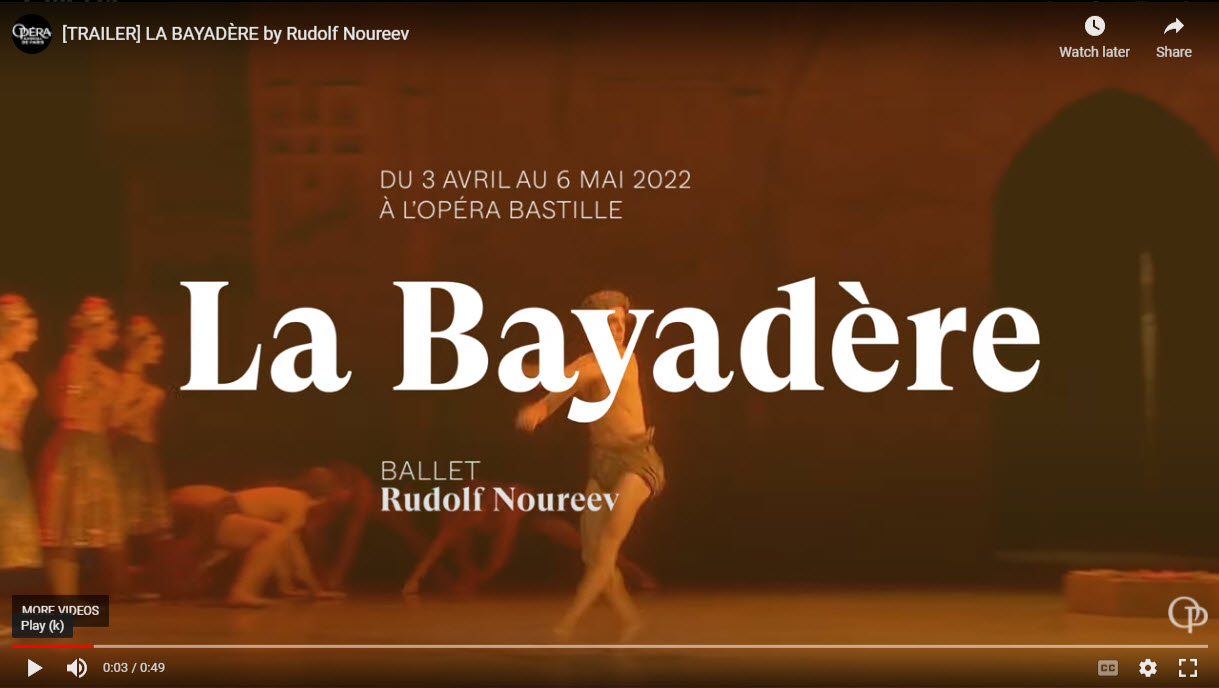 Screenshot of trailer for La Bayadère at l'Opéra Bastille
Screenshot of trailer for La Bayadère at l'Opéra Bastille
ETBP: Do you want to stay?
SA: Yes, I love my job. My colleagues are incredibly inspiring and watching them everyday keeps me motived to be my best. The works we perform can range from traditional to abstract. I love the range and the push it gives you as a dancer to move in many different ways.
ETBP: Amongst the dancers, are you comfortable? Do you feel accepted and are you developing friendships?
SA: I have an amazing community of friends who have welcomed me with open arms. It honestly feels like I've been here for 10 years!
Now, when I walk into the studio, I don't feel like an outsider anymore. I put my dance bag down and talk to whomever walks by ... I feel very much at home.

 Our Walk: Black History in and around the Luxembourg Garden - Click here to book!
Our Walk: Black History in and around the Luxembourg Garden - Click here to book!